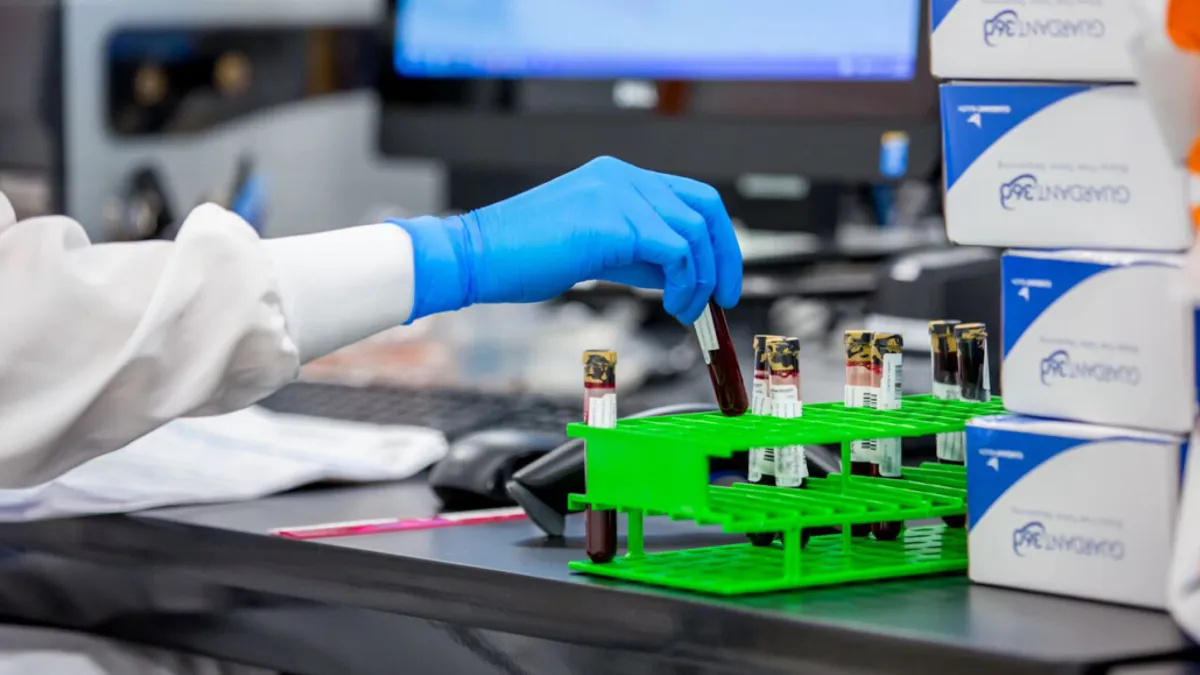Dive Brief:
- Guardant Health on Tuesday presented results of a pivotal study of Shield, its blood-based test for colorectal cancer, demonstrating an overall sensitivity of 83% and specificity of 90%.
- Looking at the results by stage, the test only detected 55% of stage I cancers. Its detection of later-stage cancers was 100%.
- The test should meet the criteria to gain FDA approval and Medicare reimbursement, but its early-stage performance will likely make Shield less competitive against Exact Sciences’ stool-based test, Cologuard, to start, analysts with Craig Hallum wrote in a research note on Wednesday.
Dive Insight:
Guardant is one of several companies looking to offer non-invasive cancer screening using blood-based tests. The Palo Alto, Calif.-based firm claims its tests can improve adherence for colorectal cancer screening. Since it began offering Shield as a laboratory-developed test last year, Guardant says the test has a more than 90% adherence rate.
In March, Guardant filed a premarket submission for the test with the Food and Drug Administration. At the Digestive Disease Week conference in Chicago, the company presented results of its ECLIPSE study, which enrolled 7,800 people. Out of 62 total cases of colorectal cancer, the test detected 83% of them.
For stage I cancer, the test only detected a little over half of 22 cases. This included an assumption that five incompletely staged malignant polyps were Stage I disease.
The test also detected just 13% of 1,116 advanced precancerous lesions.
Guardant could argue that the number of cancers by stage were too low to claim performance by a stage level, and that its test outperforms other options in adherence, Craig Hallum analysts wrote. On the other hand, competitor Exact Sciences could argue Cologuard’s data by stage was better, detecting 90% of stage I cases.
“We concur that the best test is the one that gets done, but we do think these results — especially the pre-cancer and stage I performance — may limit ultimate uptake as other non-invasive tests have much better pre-cancer and stage I sensitivity, which drive the most benefit to life years gained,” William Blair analyst Andrew Brackmann wrote in a research note on Tuesday.
“This is not to say we do not see a place in the market for a blood-test like this — we absolutely do. However, we struggle to believe this test (if approved and endorsed), with this level of early-stage performance, will take meaningful share,” Brackmann added.
Guardant is working on developing a next-generation version of its Shield test, using data from the study, which could potentially improve early-stage sensitivity, J.P. Morgan analyst Julia Qin wrote. In the meantime, Exact Sciences is also working to develop its own blood-based cancer test.
Both companies reported higher sales in the first quarter. Guardant’s revenue of $129 million increased 34% year-over-year, while Exact Sciences’ revenue of $602 million rose by 24%.











